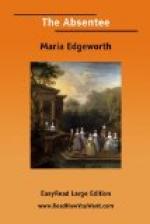‘True! very true, Lady Berryl,’ interrupted Lady Clonbrony; ’and I’ll be as delicate as you please about it afterwards; but, in the first and foremost place, I must tell her the best part of the story—that she’s an heiress, madam, never killed anybody!’ So, darting through all opposition, Lady Clonbrony made her way into the room where Grace was lying—’Yes, get up! get up! my own Grace, and be surprised—well you may!—you are an heiress, after all.’
‘Am I, my dear aunt?’ said Grace.
’True, as I’m Lady Clonbrony—and a very great heiress—and no more Colambre’s cousin than Lady Berryl here. So now begin and love him as fast as you please—I give my consent—and here he is.’
Lady Clonbrony turned to her son, who just appeared at the door.
‘Oh, mother! what have you done?’
‘What have I done?’ cried Lady Clonbrony, following her son’s eyes:—’Lord bless me!—Grace fainted dead—lady Berryl? Oh, what have I done? My dear Lady Berryl, what shall we do?’
‘There! her colour’s coming again,’ said Lord Clonbrony; ’come away, my dear Lady Clonbrony, for the present, and so will I—though I long to talk to the darling girl myself; but she is not equal to it yet.’
When Grace came to herself, she first saw Lady Berryl leaning over her, and, raising herself a little, she said—
’What has happened?—I don’t know yet—I don’t know whether I am happy or not.’
Then seeing Lord Colambre, she sat quite upright. ’You received my letter, cousin, I hope?—Do you go to Ireland with my aunt?’
‘Yes; and with you, I hope, my beloved friend,’ said Colambre; ’you once assured me that I had such a share of your esteem and affection, that the idea of my accompanying you to Ireland was not disagreeable to you; you flattered me that I formed part of your agreeable associations with home.’
’Yes—sit down by me, won’t you, my dear Lady Berryl—but then I considered you as my cousin, Lord Colambre, and I thought you felt the same towards me; but now—’
‘But now, my charming Grace,’ said Lord Colambre, kneeling beside her, and taking her hand, ’no invincible obstacle opposes my passion—no invincible obstacle, did I say? let me hope that I may say no obstacle, but what depends on the change in the nature of your sentiments. You heard my mother’s consent; you saw her joy.’
‘I scarcely knew what I heard or saw,’ said Grace, blushing deeply, ’or what I now see and hear; but of this I feel secure, before I comprehend the mystery, before you explain to me the causes of your—change of conduct, that you have never been actuated by caprice, but governed by wise and honourable motives. As to my going to Ireland, or remaining with Lady Berryl, she has heard all the circumstances—she is my friend and yours—a better friend cannot be; to her I appeal—she will decide for me what I ought to do; she promised to take me from hence instantly, if I ought to go.’




